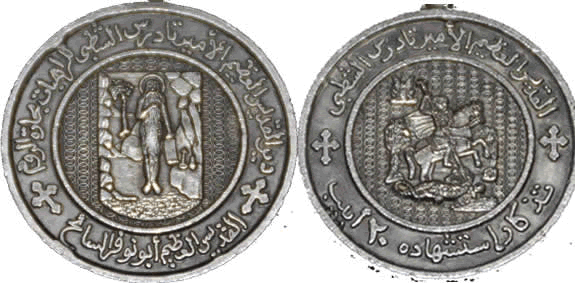Here’s a recording in a mystery language.
Can you guess the language and where it was spoken?
This pendant was sent in by a visitor to Omniglot who would like to know whether anybody can decipher the inscription on it. It depicts St. George and the dragon and might be from Turkey.

Here’s my attempt to transcribe the inscriptions:
Left image top: ديرالقديس المقيم الأمير تادرس الشطي الهاتحارة الروم
Left image bottom: القديس الفطيم أبونوفاساح
Right image top: القديرا لعكيم الاميس تادرى الشطي
Right image bottom: تذكارإ ستشهاده ٦٠ أبيب
Today we have a guest post from Stephen Dunne.
ἀρετή (arete), noun = meaning virtue, goodness, excellence, purity.
This Classical Greek word is difficult to encapsulate precisely in English but expresses a state of almost distinguished self enlightenment. It can however mean many other things besides virtues attached to the self; the Greeks did use the word to describe the form of inanimate objects like vases or statues.
There are many ways to think of the physical form of arete. In Ancient Greece is was the capacity and fulfilment of attaining one’s potential, perhaps in face of much environmental difficulty.
In Philosophy, arete is central to the notion of Virtue Ethics and many of the ideas stem from Aristotelian thought. Virtue Ethics is a serious challenge to other mainstream moral schools like Deontology or Consequentialism.
These days, it could be argued that many of the books in the post-capitalist self-help genre are centred on the notion of arete, with individuals seeking non material fulfilment.
聽筒 [听筒] (tīngtǒng) is Chinese for telephone receiver; headphone; earphone; earpiece and stethoscope. Its literal meaning is “hearing tube” – 聽 = to hear; to obey, and 筒 = tube; cylinder.
I found this word in an online Chinese dictionary I came across yesterday which looks very useful. You can search for Chinese words or characters using their characters or pinyin spelling, and the entries include traditional and simplified characters, pinyin, recordings of the pronunciation, related words, and English and French equivalents. There’s even the option of inputting characters by hand.
The dictionary seems to be part of the Chinese Tools site, which contains a translator, text-to-speech, name translators for Chinese, Japanese, Korean, Tibetan and other scripts, and other useful tools.
Chionnee mee mandalyn yn çhiaghtyn shoh erreish smooinaghtyn er rish foddey. Ta mee çheet cliaghtit rish, as ta foddym cloie beggan carryn hannah.
Cheannaigh mé maindilín an seachtain seo i ndiaidh smaoineamh air le feadh tamall. Tá mé éirigh cleachta leis, agus is féidir liom cúpla foinn a sheinm cheanna.
Mi brynes i fandolin yr wythnos hon ar ôl meddwl amdano ers amser maith. Dw i’n mynd yn gyfarwydd efo fo, ac dw i’n medru chwarae ychydig o alawon yn barod.
Here’s a recording in a mystery language.
Do you know or can you guess the language and where it’s spoken?
Here are few more election-related words:
Hung parliament – a parliament in which no political party has an absolute majority of seats, as is the case with the UK parliament after yesterday’s election. This term was first used in Britain in 1974, but hang or hung has been used to indicate a situation that’s indecisive since at least the 14th century, when it was became linked to the idea of suspense. The phrase ‘hung jury’, i.e. one that cannot agree, has been used in the USA since 1848 [source].
Coalition – was first used in a political sense in 1715 and comes from the Latin Latin coalitus (fellowship) via the French coalition. Coalitus was originally the past participle of Latin coalescere, which is a combination of com- (together) plus alescere (to grow up).
The Welsh equivalents of these words are:
Senedd grog = hung parliament: senedd = parliament, senate; crog = hanging, pendant, suspended, pendent, pendulous, pensile
Clymblaid = clique, coterie, coalition: clym- probably comes from clymu = to tie; plaid = party, faction.
Plaid is also the root of pleidlais = vote (llais = voice); pleidleisio = to vote; pleidleisiwr = voter.
With the UK general election coming up tomorrow, I thought I’d look at the origins of a few election-related words.
Vote comes from the Latin votum (a vow, wish, promise, dedication), which can be traced back to the PIE root *ewegwh- (to speak solemnly, vow). It first appeared in writing during the 15th century.
Election, which dates from the late 13th century, comes via the Anglo-Norman eleccioun (choice, between legal alternatives), from the Latin electionem, which is derived from eligere (to pick out, select).
Hustings comes from the Old Norse húsþing (council) from hus (house) plus þing (assembly). Hustings was first used to mean “a temporary platform for political speeches” during the early 18th century, and its meaning later expanded to include the whole election process.
The Alþingi or Althing is Iceland’s parliament and comes from the Old Norse al (all) plus þing. The name of the Isle of Man’s parliament, the Tynwald, comes from the Old Norse Þingvellir (assembly fields).
Parliament comes from the Old French parlement, which originally meant “speaking, talk,” from parler (to speak). The origins of parler can be traced back to the Late Latin parabolare (to speak (in parables)), from parabola (speech, discourse).
[update 06.05.10]
Candidate comes from the Latin candidatus (one aspiring to office), which originally meant “white-robed”, and is the past participle of candidare (to make white or bright). Office-seekers in ancient Rome traditionally wore white togas to symbolise their purity and worthiness for office. Every day togas were off-white or tan coloured.
The origins of candidare can be traced back to the PIE root *kand- (to glow, to shine) via the Latin candidum (white; pure; sincere, honest, upright) from candere (to shine). Other words that come from the same root include candle, candid, incandescent and incense.